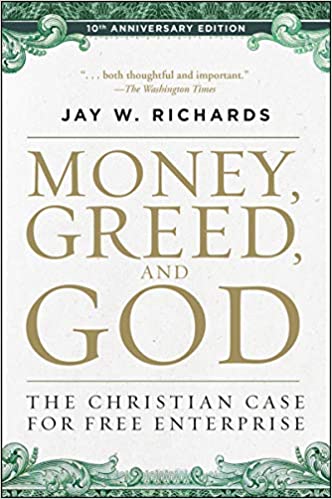A Brief “Bonus” Book Summary from Books At a Glance
By Benjamin J. Montoya
About the Author
Jay W. Richards, Ph.D., O.P., is an Assistant Research Professor in the School of Business and Economics at The Catholic University of America
Introduction
It is no political secret that people take sides on the camps of capitalism and communism. The author of this book used to side with communism. But as he studied the issue further as a Christian, he realized that his acceptance of communism and rejection of capitalism was based on eight myths that will be addressed in this book:
- The Nirvana Myth (contrasting capitalism with an unrealizable ideal rather than with its live alternatives)
- The Piety Myth (focusing on our good intentions rather than on the unintended consequences of our actions)
- The Zero-Sum Game Myth (believing that trade requires a winner and a loser)
- The Materialist Myth (believing that wealth isn’t created, it’s simply transferred)
- The Greed Myth (believing that the essence of capitalism is greed)
- The Usury Myth (believing that working with money is inherently immoral or that charging interest on money is always exploitive)
- The Artsy Myth (confusing aesthetic judgments with economic arguments)
- The Freeze-Frame Myth (believing that things always stay the same—for example, assuming that population trends will continue indefinitely, or treating a current “natural resource” as if it will always be needed)
Table of Contents
Chapter 1 Can’t We Build a Just Society?
Chapter 2 What Would Jesus Do?
Chapter 3 Doesn’t Capitalism Foster Unfair Competition?
Chapter 4 If I Become Rich, Won’t Someone Else Become Poor?
Chapter 5 Isn’t Capitalism Based on Greed?
Chapter 6 Hasn’t Christianity Always Opposed Capitalism?
Chapter 7 Doesn’t Capitalism Lead to an Ugly Consumerist Culture?
Chapter 8 Are We Going to Use Up All the Resources?
Chapter 1: Can’t We Build a Just Society?
The author of this book has a story that is like many. He went to college in support of communism and his college courses allowed him to study and firm up his view on that position even further. But the key question for Christians is this: is the model of communism a biblical model and one that has historically delivered on what it promises?
There have been many who have looked at what the Jerusalem church did in Acts 2 as a way to support communism from the Bible. Christians there were living communally and sharing their goods. But what this interpretation fails to realize is that this chapter described what was happening, not prescribing a model for all Christians everywhere at all times. Similarly, people cite Peter’s condemnation of Ananias and Sapphira as support of communism. The problem with this interpretation is not that they owned private property or that they sold it to give it away—the problem was that they lied about keeping some of the profits for themselves. The issue was not that they kept part of the profits. It was the dishonesty.
Communism has never delivered on what it promises. It promises a kind of utopia that never comes about. Part of the reason why is that communism is dehumanizing, treating humans and their society like wet clay that can be shaped however politicians want. That has never worked. What has happened is that the leaders in charge have had to kill their opposition to try to accomplish their goals. The amount of people they have killed for such reasons is staggering:
China 65 million
U.S.S.R. 20 million
North Korea 2 million
Cambodia 2 million
Africa 1.7 million
Afghanistan 1.5 million
Vietnam 1 million
Eastern Europe 1 million
Latin America 150,000
International Communist
movement 1,000,010
Source: The Black Book of Communism (Cambridge, MA: Harvard Univ. Press, 1999), 4.
Christians must remember that when it comes to our place in this world, we live in the now-but-not-yet. Yes, God is reigning over creation. But, we have to wait to see that reign like the Bible predicts it will be one day. Things now will not look like they should. We have to accept that. Does that mean we do nothing to try to make society better? Of course not. But it means that our expectations for this world regarding economics and politics need to be kept in check to avoid accepting the myths of communism.
The myth debunked in this chapter is the Nirvana myth: contrasting capitalism with an unrealizable ideal rather than live with its alternatives.
Chapter 2: What Would Jesus Do?
What would Jesus do with our discussion of communism and capitalism? Would his teachings support the former out of good intentions for the people who need wealth redistributed? Let’s consider the issues carefully.
First, Jesus’s teachings about having compassion on others do not in any way support communism. That is a clear misreading of his teachings. There is no question that God shows his concern for the poor throughout Scripture. We ought to help and remember the poor. But, economically, despite the importance of motivation, what we actually end up doing is what matters.
[To continue reading this summary, please see below....]The remainder of this article is premium content. Become a member to continue reading.
Already have an account? Sign In
